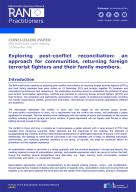Details
- Publication date
- 23 March 2023
- Author
- Directorate-General for Migration and Home Affairs
- RAN Publications Topic
- Foreign Terrorist Fighters and their families
- Islamist extremism
- Rehabilitation
- Restorative justice
Description
The RAN small-scale meeting on exploring post-conflict reconciliation of returning foreign terrorist fighters (RFTFs) and their family members took place online on 13 December 2021 and brought together 16 European and international practitioners and researchers. The explorative workshop aimed to understand the potential of using post-conflict reconciliation approaches, methods and practices on returning foreign terrorist fighters (RFTFs) and their families. The presenters and participants represented a wide variety of professional backgrounds, including civil society organisations (CSOs), government authorities, international non-governmental organisations (INGOs) and academics.
The discussions addressed the conflict in Syria and Iraq waged by the terrorist group Daʿesh. For post-conflict reconciliation to start, it’s a requirement that the conflict has ended, and preferably a peace agreement is arranged. This has become more challenging with the variety of actors and complexity of the current conflicts including terrorist groups and proxy warfare. A peace agreement will not happen with Daʿesh or other fighting terrorist groups in the region. The conflict in Syria and Iraq is complex as it encompasses a global element with a large amount of FTFs that travelled from numerous countries. Other elements are the magnitude of the violence, the attempts of propagandising the violence, and the indiscriminate perpetrations of (attempted) genocide of groups in the region.
Additionally, the ideology to which Daʿesh subscribed is far from defeated and it keeps on affecting individuals, communities, and recruiting potential members to the group. In parallel, the need for continued efforts for prevention is of the highest importance. As reconciliation related to terrorism is a newer approach with few practical examples in Europe and beyond, the meeting explored a range of preconditions, settings, and possible approaches which can serve to further the field.
During the meeting, several perspectives were discussed, e.g.: legal, security, local communities, recipient communities, and victim- vs. perpetrator-focused. Reconciliation approaches could be complementary to the already existing judicial-, victim-, and rehabilitation focused approaches. Instead of dealing with each sector in separate silos, reconciliation would aim to bring them all together in an attempt to address the harm done and the needs of the receiving communities, aiming to reintegrate the perpetrators and build peaceful communities. First and foremost it would centre around fact finding; both perpetrators and victims should be allowed to share their view of what happened and why this happened. Additionally, there should be room for the victims to share their grievances and for the perpetrators to explain their motives and possibly show remorse.

